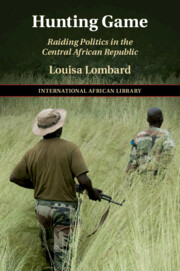Book contents
- Hunting Game
- The International African Library
- Hunting Game
- Copyright page
- Contents
- Figures
- Maps
- Acknowledgements
- Abbreviations and acronyms
- Map
- 1 Force, status, and uncertainty in the arts of acquisition
- 2 Zariba contests and collaborations
- 3 Manhunts persist in an unfortunate colony
- 4 Big-game hunting and regulatory sociality
- 5 The limits of law in coercive conservation
- 6 Camouflage skills
- 7 Denunciation and liberty
- 8 Force and status in rebellion
- 9 Sovereignty and distribution amid forceful acquisition
- References
- Index
- Titles in the series
8 - Force and status in rebellion
Published online by Cambridge University Press: 20 April 2020
- Hunting Game
- The International African Library
- Hunting Game
- Copyright page
- Contents
- Figures
- Maps
- Acknowledgements
- Abbreviations and acronyms
- Map
- 1 Force, status, and uncertainty in the arts of acquisition
- 2 Zariba contests and collaborations
- 3 Manhunts persist in an unfortunate colony
- 4 Big-game hunting and regulatory sociality
- 5 The limits of law in coercive conservation
- 6 Camouflage skills
- 7 Denunciation and liberty
- 8 Force and status in rebellion
- 9 Sovereignty and distribution amid forceful acquisition
- References
- Index
- Titles in the series
Summary
Although forceful, militia-led conservation continues in north-eastern CAR, it has been joined and at times supplanted by rebellions, some led by former pisteurs who have turned their martial skills to this new end. Rebellious ways and intervention by outsiders have long histories in Central Africa, but the particular forms these practices have taken in the last 15 years are new. Among other changes, men consciously self-style as rebels, and there has been an enormous influx of the people I have elsewhere called the ‘good intentions crowd’ (international organisation officials, aid organisation employees, diplomats, and others who understand themselves as ‘external’ and altruistic and yet become central and interested participants in rebellion in post-Cold War Africa). This chapter shows how the new rebels relate to and transform the serious games around forceful acquisition and status that are the book’s main focus. This project provides an opportunity to sit with four adventurous men involved in these shifts around force, acquisition, and status over the last few decades. All had been previously involved in different kinds of shows of force, such as the denunciations for the sake of liberty that made up such a big part of conservation work. Now, by using the symbolic register of rebellion, they want their shows of force to communicate something else: namely their status as meriting regard, a status they imagined would take the form of a salaried or otherwise entitled relationship to the state. They hoped that the good intentions crowd’s involvement would help them leverage their demands for distribution. In this respect, the rebels have largely failed, or at least been disappointed. But while they have not achieved the kind of entitled status they hoped for, they have also enjoyed certain adventurous aspects of their careers and the new lifestyles and ideas they have encountered.
- Type
- Chapter
- Information
- Hunting GameRaiding Politics in the Central African Republic, pp. 191 - 214Publisher: Cambridge University PressPrint publication year: 2020



